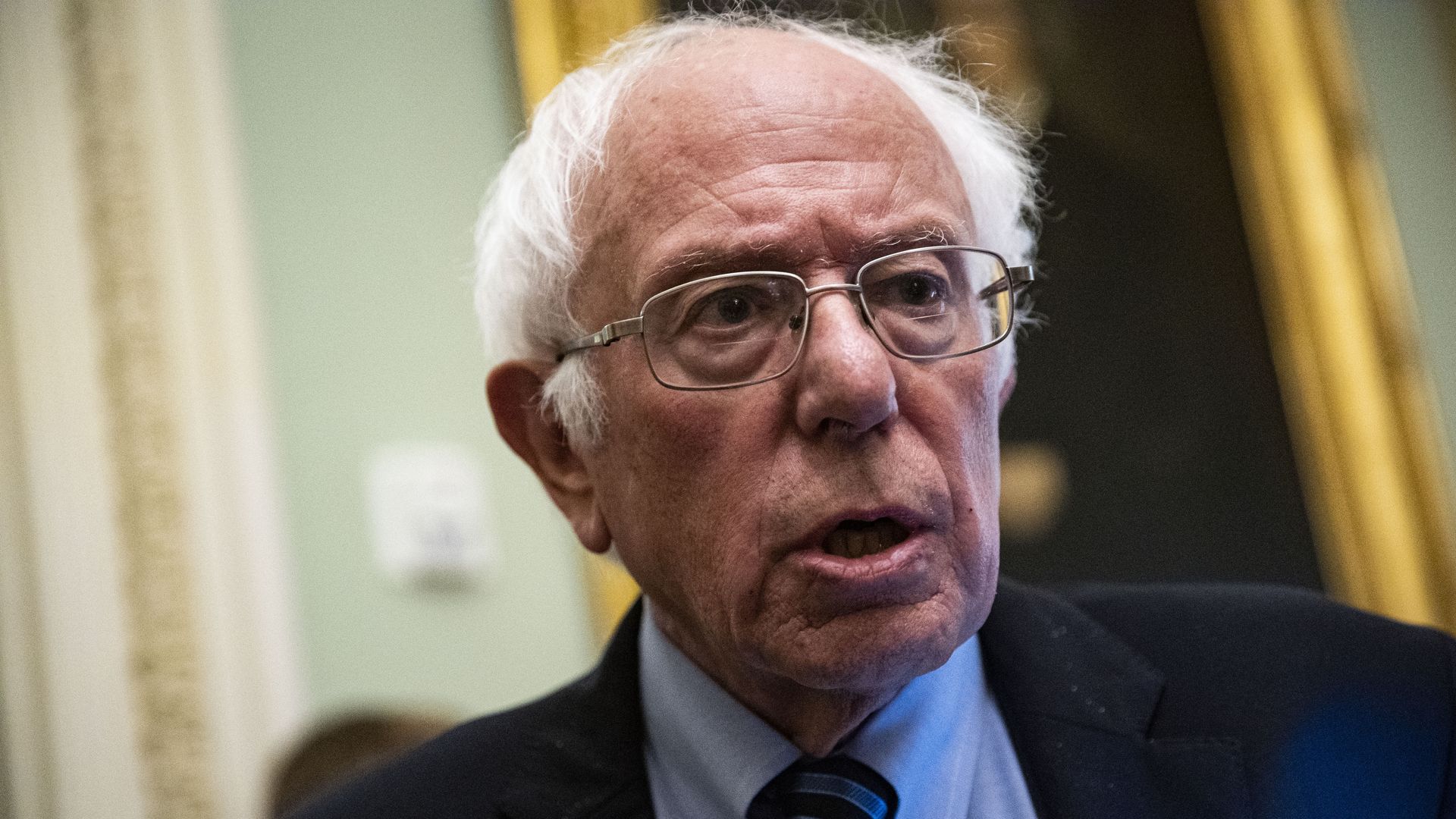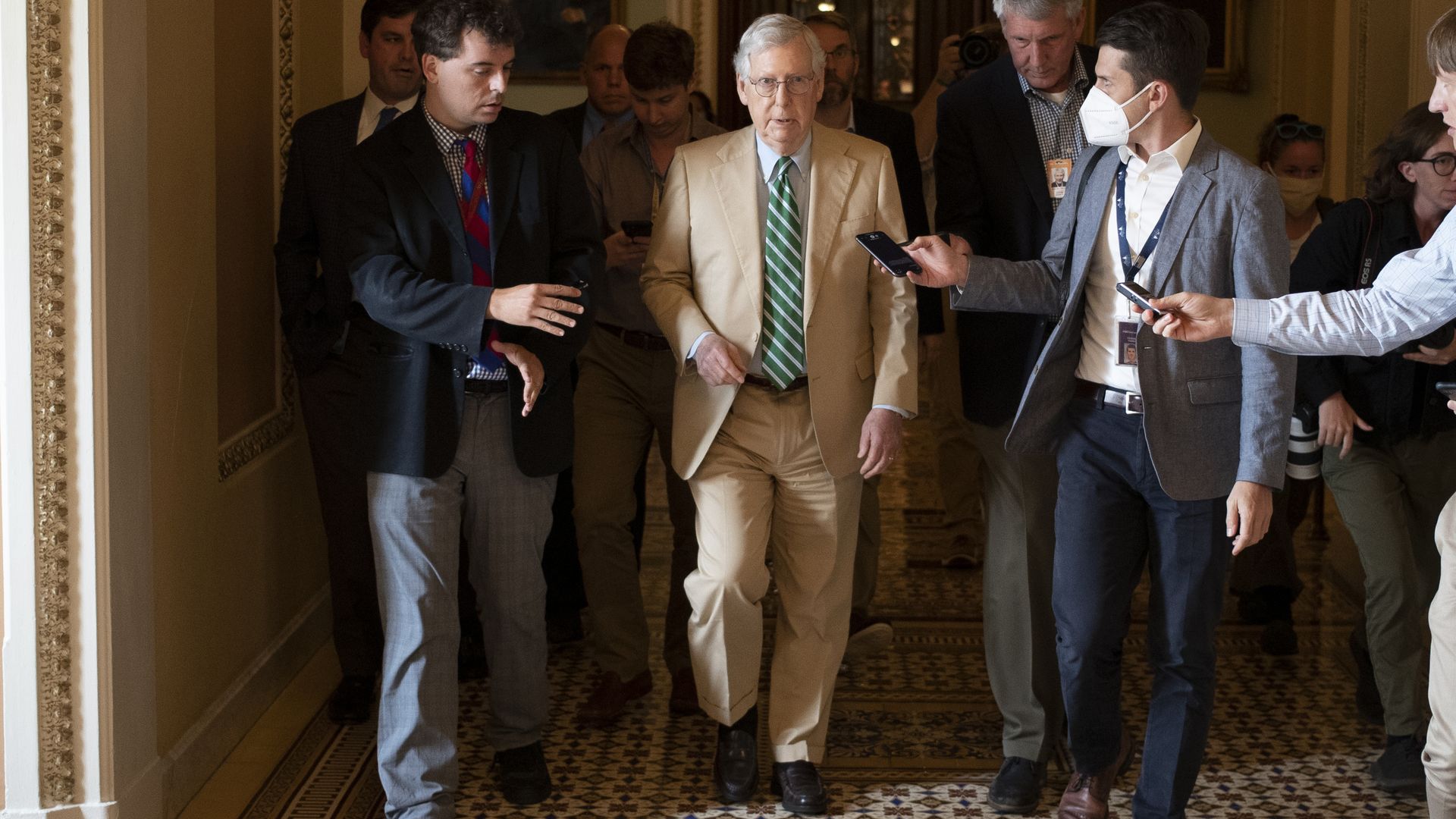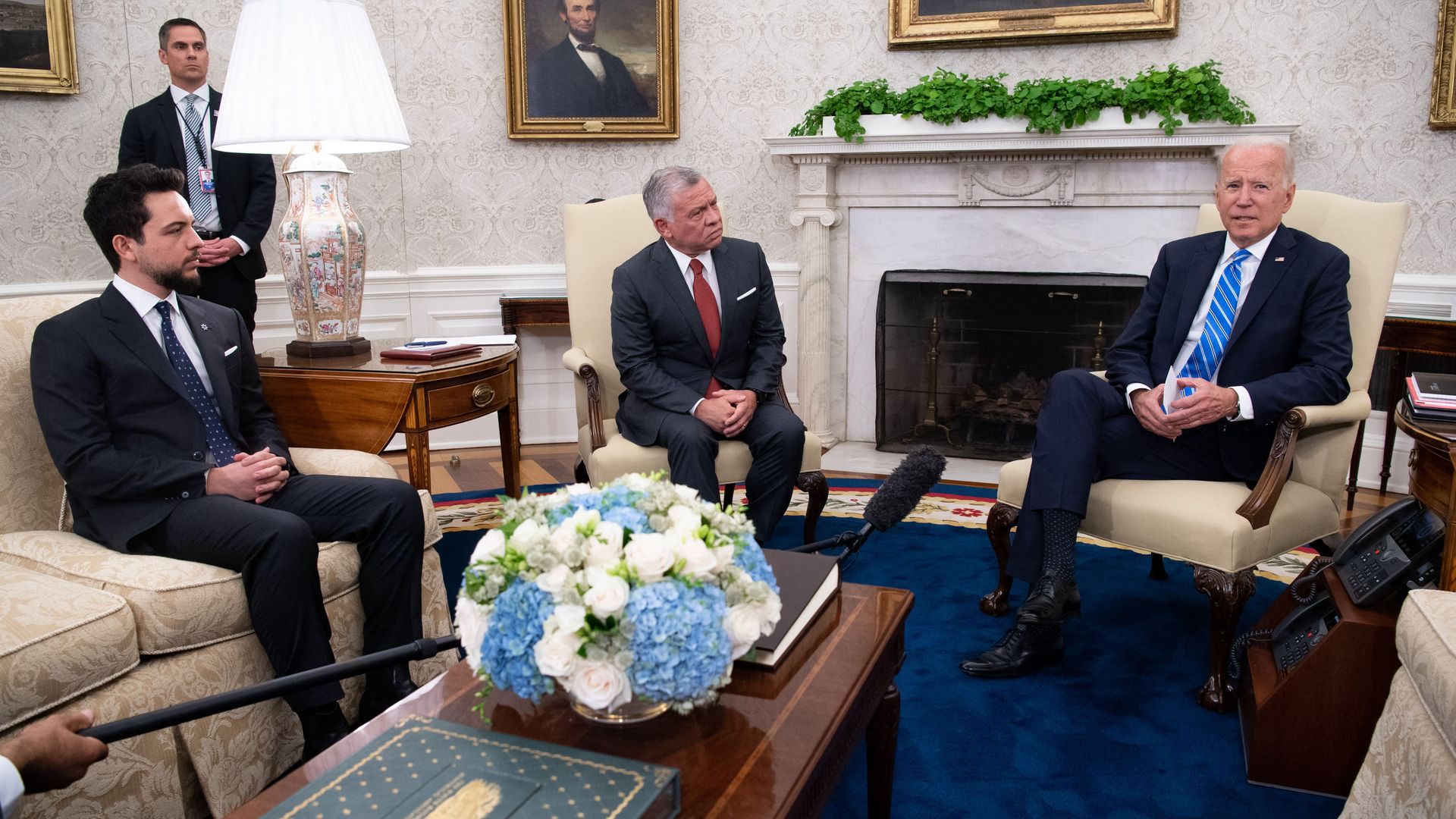| | | | | | | Presented By Goldman Sachs 10,000 Small Businesses Voices | | | | Axios Sneak Peek | | By Alayna Treene and Hans Nichols ·Jul 19, 2021 | | Welcome back to Sneak. The House is back after two weeks! 🚨 Breaking: "McCarthy decides on 5 Republicans for Jan. 6 select committee." ⚡ Situational awareness: Capitol tours remain on hold as the Delta variant is surging, a House Democratic leadership aide told Axios' Alayna Treene. - The news comes after Rep. Vern Buchanan (R-Fla.) tested positive for COVID-19 despite being fully vaccinated.
Smart Brevity™ count: 1,527 words ... 6 minutes. Edited by Glen Johnson. | | | | | | 1 big thing: Dems' backdoor Medicare expansion |  | | | Sen. Bernie Sanders. Photo: Al Drago/Bloomberg via Getty Images | | | | Senate Democrats are debating lowering the Medicare eligibility age as part of the $3.5-trillion "soft" infrastructure package, at the risk of jeopardizing centrist support for a measure being pushed by Sen. Bernie Sanders (I-Vt.), Axios' Hans Nichols reports. Why it matters: Giving Americans over age 60 access to Medicare would force Democrats to either add an estimated $200 billion to their overall infrastructure price tag or cut other progressive priorities currently in the package. - Medicare expansion wasn't in the initial agreement that Democrats reached — and President Biden endorsed — last week.
- But progressives haven't given up hope it could be included, in some form, in a final infrastructure package. Critics will argue that expanding Medicare eligibility is a backdoor to government-run health care or "Medicare for All."
- Lowering the Medicare age would all but guarantee a brutal fight with hospital associations, adding another powerful lobbying group — along with the pharmaceutical industry — in opposition to any deal.
The intrigue: The true cost of Sanders' ambitious plan to expand the social safety net is difficult to determine, in part, because Senate Democrats haven't been precise about how long they plan to fund new programs. - The actual costs could be between $5 trillion and $5.5 trillion over 10 years, if all the changes are made permanent, according to the Committee for a Responsible Federal Budget (CRFB), a budget watchdog group.
- For example, the cost of the Child Tax Credit, which was included for one year in the $1.9 trillion coronavirus relief bill Biden signed into law in March, could cost up to $1.5 trillion over 10 years.
- Giving elements different durations would allow Democrats to present an overall price tag that differs, in reality, from the long-term cost of their package.
Between the lines: While Biden didn't initially run on expanding access to Medicare, he agreed to support lowering the age from 65 to 60 in April 2020, when his campaign worked on a unity platform with Sanders' team. - Earlier this year, a group of 150 House Democrats urged the president to include Medicare expansion in his Build Back Better agenda.
- Biden did propose covering dental, vision and hearing costs in his budget, which carried over to the current infrastructure framework. That has an estimated $370 billion price tag and is in the current $3.5 trillion soft infrastructure framework.
Keep reading. |     | | | | | | 2. House builds infrastructure alliances |  | | | Illustration: Sarah Grillo/Axios | | | | Members of the House are forming alliances and gearing for battle while waiting for the Senate to work out final details of the infrastructure deal, Axios' Sarah Mucha writes. Why it matters: The lower chamber has been on the sidelines during its two-week recess, yet representatives have been watching senators carefully in anticipation of their own debate on the measures that will be shipped their way. Between the lines: Potential coalitions and red lines are being formed around several issue items: - Immigration: As more calls come in to include immigration reform in one part of the infrastructure package, moderate Democrats are wary of anything going beyond the most basic reform — like providing security for so-called Dreamers.
- Climate change: Some progressives are eager to see a number of climate reform measures, including the repeal of fossil fuel subsidies or investments in electric vehicle infrastructure.
- These red lines or lobbying coalitions are especially important to members who fear progressive goals will die or be left out of the debate in the Senate.
What to watch: House Speaker Nancy Pelosi (D-Calif.) could alleviate the concerns by guaranteeing she will put some hot-ticket items up for a vote if they aren't included in a budget reconciliation bill passed by the Senate. - That would be a step toward ensuring some cohesion within her caucus.
What we're watching: Money is no longer the issue. Aside from something like a $6 trillion price tag on a reconciliation — as suggested by Sen. Sanders — moderates don't seem as concerned about the total cost of any infrastructure spending as much as they care about deliverables within the final package. - Deliverables — roads, bridges, local pork — win elections.
- Democrats, particularly those preparing for tight midterm races, want infrastructure spending approved with plenty of time for money to be sent to their districts, so shovels can get into the ground as quickly as possible.
- And with such a tight margin in the majority, those moderates in swing districts see a danger in being the member who killed the bill by voting against such deliverables over a principled argument about their cost.
Keep reading. |     | | | | | | 3. By the numbers: Would-be Dreamers |  Data: Migration Policy Institute, U.S. Citizenship and Immigration Services; Chart: Will Chase/Axios The fate of roughly 80,000 people who applied for but hadn't been approved for the Deferred Action for Childhood Arrivals (DACA) program rests with Congress — and the Senate parliamentarian, Axios' Stef Kight writes. Why it matters: A federal judge Friday blocked roughly 500,000 to 700,000 unauthorized immigrants brought to the U.S. as children from participating in DACA and receiving its deportation protections. Nothing changed — for now — for the more than 600,000 active DACA recipients. By the numbers: California, Texas and Florida have the largest number of immigrants qualified for DACA but not actively enrolled in the program. That's based on data from U.S. Citizenship and Immigration Services, which handles legal immigration, and the Migration Policy Institute's December estimates of DACA-eligible populations by state. - California, Texas and Illinois have the greatest number of active DACA recipients.
- As of the end of March, 81% of DACA recipients were from Mexico, and 9% were from the Northern Triangle (Guatemala, Honduras and El Salvador).
- Most are now in their 20s.
What they're saying: Multiple Democratic Senate aides told Axios that last week's ruling heightened the urgency to pass pathways to citizenship for Dreamers. - Even before the ruling, Democrats planned to include pathways for Dreamers, Temporary Protected Status holders and essential workers in their sweeping $3.5-trillion, "soft" infrastructure reconciliation package.
- That would allow them to pass the provisions with a simple majority.
What to watch: Senate Majority Leader Chuck Schumer (D-N.Y.) has set Wednesday as a deadline for Democrats to come to an agreement on the general framework of the bill, which includes immigration. - Details of the bill — including specifics on pathways for undocumented immigrants — likely won't be available until late September or early October, one Democratic Senate aide familiar with the negotiations said.
But, but, but: There's a chance the Senate parliamentarian says immigration changes can't be passed through a budget reconciliation process. - That happened earlier this year with the Democrats' effort to raise the minimum wage.
|     | | | | | | A message from Goldman Sachs 10,000 Small Businesses Voices | | Congress must change the small business federal procurement process | | |  | | | | The number of small businesses participating in federal contracts has declined 38% over the past decade, according to the Bipartisan Policy Center. Why it's important: To compete, small businesses must have access to the federal procurement process. Learn more. | | | | | | 4. GOP split over infrastructure messaging |  | | | Republicans are looking to Senate Minority Leader Mitch McConnell, seen Monday, for their infrastructure cue. Photo: Tom Brenner/Bloomberg via Getty Images | | | | Republicans are all over the map about how their party should proceed on the $1.2 trillion bipartisan infrastructure proposal, Alayna writes. What we're hearing: GOP strategists tell Axios they've struggled over not only whether they support the current Senate negotiations but how to message off the broader infrastructure debate. There are competing dynamics at play, they say, making it difficult: - The conservative movement has existential worries about the increase in spending, particularly as vaccines fuel a better economy and inflationary fears grip consumers — and send the stock market diving, as happened today.
- They're wary of going on the record supporting a package that includes such a steep price tag, particularly after Congress already passed a $1.9 trillion coronavirus package this year.
- They're also terrified of being held responsible for killing a bipartisan deal for something everyone loves: roads, bridges and photogenic local pork.
- All this comes as they try to message against "reconciliation" and "inflation" — two terms not well understood by everyday Americans — and search for ways to simplify their attacks.
The latest: Schumer tonight formally set up a Wednesday vote on a motion to advance the bipartisan proposal. - This was expected but came as multiple Republican senators, including those involved in negotiations, threatened to vote against advancing the deal if the bill remained unwritten.
- The majority leader then announced that if the bipartisan group does not finalize text of the agreement in time for Thursday's session, he will offer an amendment "consisting only of the elements of the bill that have already been put through committee on a bipartisan process."
- This could sway enough GOP members in favor. Schumer said the five leading Democratic negotiators — all moderates — embraced this approach.
Between the lines: Many Republican senators are waiting for Senate Minority Leader Mitch McConnell (R-Ky.) to provide needed direction. - McConnell has, so far, intentionally not gotten involved. The fact that the bipartisan bill is not even written yet, and will then take several days to be scored by the Congressional Budget Office, buys him more time.
- Sources familiar with his strategy tell Axios he doesn't want to kill the bill, because there are Republican members who really want it to pass, and because he thinks it has some appealing provisions.
Keep reading. |     | | | | | | 5. Pic du jour |  | | | Photo: Saul Loeb/AFP via Getty Images | | | | President Biden greeted not only Jordan's King Abdullah II but also his eldest son, Crown Prince Hussein, in the Oval Office. - The prince — who studied at Georgetown University — is being groomed to replace his father, just as the father succeeded the king for whom his son is named.
- The high-profile photo op comes months after King Abdullah II accused his half-brother of trying to destabilize their country.
|     | | | | | | A message from Goldman Sachs 10,000 Small Businesses Voices | | Congress must change the small business federal procurement process | | |  | | | | The number of small businesses participating in federal contracts has declined 38% over the past decade, according to the Bipartisan Policy Center. Why it's important: To compete, small businesses must have access to the federal procurement process. Learn more. | | | | 📬 Thanks for reading. A reminder your family, friends and colleagues can subscribe to this or any of Axios' other free newsletters by clicking here. |  | | It'll help you deliver employee communications more effectively. | | | | | | Axios thanks our partners for supporting our newsletters. If you're interested in advertising, learn more here.
Sponsorship has no influence on editorial content. Axios, 3100 Clarendon Blvd, Suite 1300, Arlington VA 22201 | | | You received this email because you signed up for newsletters from Axios.
Change your preferences or unsubscribe here. | | | Was this email forwarded to you?
Sign up now to get Axios in your inbox. | | | | Follow Axios on social media:    | | | | | |









No comments:
Post a Comment